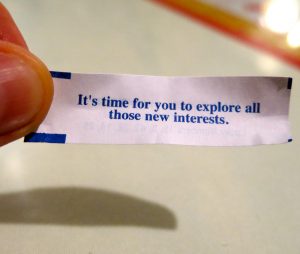
In my school years, I truly enjoyed learning languages and believed that I am good at it, that this was my talent. On the other hand, I had trouble with chemistry, which was also obvious to me – I just had no talent for chemistry, and there didn’t seem much I could do about it. Doesn’t such a story ring a bell to many of us? Often we have a tendency to quickly categorize our skills and potential, believing that we have a ‘gene’ for some domains, while we don’t for others…
Carol Dweck’s research indicated that such belief systems are important, as they are linked with our motivation to persist on a task and make prolonged efforts to develop ourselves. Dweck’s Mindsettheory proposes that some people have a so-called fixed mindset– a belief that their abilities and skills are fixed and can’t be changed – while others adopt a growth mindset, a belief that abilities and skills can be developed with effort. In essence, after failing a math test, a student with a fixed mindset will conclude that ‘I am not good at math (full stop)’, whereas a student with a growth mindset will think that ‘I am not good at math YET’. The subsequent motivation in putting more effort towards math studies is likely to be very different for the two students. Mindset theory has already found large recognition and implications in the field of education, and recent research suggests that we should start taking a closer look at it in the organizational setting as well.
In addition to beliefs about intelligence or talent, mindset theory seems to be well applicable also for the domain of interests or passions. We have probably all heard the popular notion of finding one’s passion, which in terms of mindsets, would imply a fixed approach, hence the belief that each of us either possesses, or doesn’t, a passion for some domain. In other words, if you happen to have a passion for arts, you just have to find and awaken it… and if it is not there, no search and ‘revival’ actions will help you. In contrast, a growth mindset view would argue that passions and interest are not fixed but can be developed. The latest research by Dweck and colleagues (2018) indicates that people, who hold a fixed mindset towards their interests, are less likely to develop an interest outside of their existing domain, expect passions to be accompanied by boundless motivation (and hence do not anticipate any difficulties with motivation), and more easily abandon new interests in light of difficulties compared to people with a growth mindset.
In their article about the findings for HBR, Dweck and colleagues propose that a growth mindset could be quite beneficial to organizational settings, especially in light of continuous globalization and increasing requirements for novel solutions and interdisciplinary problem solving. I would totally agree with this notion. Given the volatile socio-political environment of global business, the need for thinking outside the box, flexibility and diversification of skills seem evident. Moreover, there is a clear trend of decreased standardization of jobs and tasks, as everything standardized is becoming automatized, which increasingly leaves people with tasks that imply creative and novel approaches. Given these circumstances of modern jobs, employees with a willingness to broaden their interests and collaborate across disciplines seem valuable resources indeed, and this idea is not that new. Almost a decade ago, the idea of a T-shaped employee was popularised by Tim Brown, the CEO of IDEO, a world-leading design firm known for its collaborative and innovative workplace practices. The shape of the letter “T” is used to describe people, who possess both the deep knowledge and skills in a particular area of specialization (vertical bar of the T), and a desire and ability to collaborate across disciplines (horizontal bar of T). Already in 1997 James Burke wrote the ‘Pinball effect’, a book about the history of science and technology, which documents how new ideas and innovation often arise from unpredictable connections between people, fields and ideas.
So, today, we need to have the ability to ‘pinball’ around and connect different knowledge. Before developing the ability though, we might cultivate our growth mindset, which would support our willingness to develop new passions and interests outside of our comfort zone.


The truth is that with motivation you can get what you want, I think it is vital not only for work, but also for everything that one sets out in life